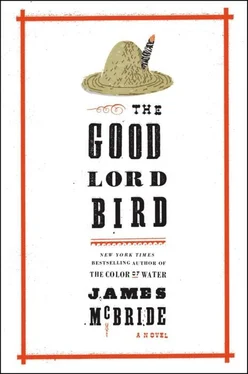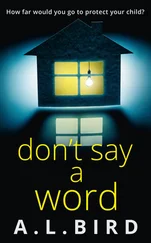He sighed angrily, blowing through his nose now. “Oh, they talk a good game, writing stories for the abolitionist papers and such. But writing stories in the paper and making speeches ain’t the same as being out here doing the job. On the line. On the front line. The freedom line. They talk a whole heap, them stuffed-shirt, tidy-looking, tea-drinking, gizzard lickers, running around New England in their fine silk shirts, letting white folks wipe their tears and all. Box Car Brown. Frederick Douglass. Shit! I know a colored feller in Chambersburg worth twenty of them blowhards.”
“Henry Watson?”
“Forget names. You ask too many questions and know too God-damned much now.”
“You ought not to use God’s name in vain. Not when the Captain comes.”
“I ain’t studying him. I been working the gospel train for years. I know his doings. Been hearing of ’em for as long as I been doing this. I like the Captain. I love him. Many a night I prayed for him. And now he ...” He groused and cursed some more. “He’s deader than yesterday’s dinner, is what it is. How many’s in his army?”
“Well, last count there was ... sixteen or so.”
The Rail Man laughed. “That ain’t hardly enough for dice. The Old Man’s lost his buttons. At least I ain’t the only one that’s crazy.” He sat down at the water’s edge now, then tossed a rock in the water. It made a tiny splash. The moon shone down on him brightly. He looked terrifically sad. “Gimme the rest,” he said.
“Of what?”
“The plan.”
I gived it to him from soup to nuts. He listened closely. I told him all ’bout taking the night watchman in the front and back entrance, then fleeing to the mountains. After I was finished, he nodded. He seemed calmer. “Well, the Ferry can be took, that much the Captain’s right ’bout. There ain’t but two watchmen. But it’s the second part I don’t get. Where’s he expecting his coloreds to come from, Africa?”
“It’s in the plan,” I said, but I felt like sheep bleating.
He shook his head. “John Brown is a great man. God bless him. He ain’t lacking in courage, that’s for sure. But God’s wisdom has escaped him this time. I can’t tell him how to do his business, but he’s wrong.”
“He says he’s studied it for years.”
“He ain’t the first person who’s studied insurrection. Coloreds been studying it for a hundred years. His plan can’t work. It ain’t practical.”
“Could you make it so, then? Being that you’s a big wheel in the gospel train around here? You know which coloreds would fight, don’t you?”
“I can’t make two hundred coloreds get up outta Baltimore and Washington, D.C., and come up here. He needs at least that many to bust out the armory and get to the mountains once he’s got what he wants. Where’s he gonna get them kind of numbers? He’d need to run souls from Baltimore up through Detroit and down to Alabama.”
“Ain’t that what you do?”
“Running one or two souls ’cross the freedom line to Philadelphia is one thing. Running two hundred souls from D.C. and Baltimore this way is another. That’s impossible. He’d have to spread the word far and wide, all the way down to Alabama to make sure he gets them kind of numbers. The gospel train can carry a word fast, but not that fast. Not in three weeks.”
“You saying it can’t be done?”
“I’m saying it can’t be done in three weeks. Takes a letter a solid week to get from here to Pittsburgh. Sometimes a rumor travels faster’n a letter—”
He thought a minute.
“You say he’s throwing big metal at ’em in three weeks?”
“October twenty-third. In three weeks.”
“There ain’t no time, really. It’s a God-damn shame. Criminal, really. Except ...” He fingered his jaw, thinking. “Y’know what? Tell you what. Pass the word on to the Old Captain thusly—you let him decide on it. For if I speaks it, and someone asks it of me, I’m bound by the Lord’s word to tell the truth, and I don’t want that. I’m a good friend of the mayor of this town, Fontaine Beckham. He’s a good friend to the colored, and to me. I got to be able to tell him, if he asks, ‘Mr. Mayor, I knows nothing ’bout this whole bit.’ I can’t lie to him. Y’understand?”
I nodded.
“Pass word to the Old Man thusly: There’s hundreds of coloreds in Baltimore and Washington, D.C., itching for a chance to fight slavery. But they got no telegraph and gets no letters.”
“So?”
“So how would you pass word fast to thousands of folks who got no telegraph and gets no letters? What’s the fastest way from point A to point B?”
“I don’t know.”
“The railroad, child. That gets you to the city. But then you got to get to the colored. And I know just how to do it. Listen. I knows a few in Baltimore runs a numbers game. They collect numbers every day from both those in bondage and those that’s free. They pays out to the winner no matter what. Hundreds plays it every single day. I plays it myself. If you can get the Old Man to give me some money to grease them feller’s palms, the numbers men will spread the word fast. It’ll go everywhere within a day or two, for them types don’t fear the law. And if there’s a penny in it for them, that’s all they care ’bout.”
“How much money?”
“’Bout two hundred and fifty oughta do it. That’s twenty-five apiece. Some for them in Washington and some for the men in Baltimore. There’s ten of ’em I can think of.”
“Two hundred and fifty dollars! The Old Man ain’t got five dollars.”
“Well, that’s what he got to work with. Get me that money and I’ll spread it around in Baltimore and D.C. And if he throws in another two hundred fifty, I’ll have a set of wagons and horses to throw at it, so them fellers that wants to join him—I expect it’ll be women, too, lots of ’em—they’ll ride here. Ain’t but a day’s ride from here.”
“How many wagons?”
“Five oughta do it.”
“Where they gonna come from?”
“They’ll follow the tracks. Tracks cut a pretty straight path here from Baltimore. A dirt trail follows it along. There’s a couple of bad patches of trail—I’ll school the Negroes on it—but the trail is all right. The train don’t travel but twenty or thirty miles an hour. It stops every fifteen minutes to pick up passengers or water. They’ll be able to keep up all right. They won’t fall far behind.”
He paused a moment, staring out at the water, nodding, thinking, hatching it in his head as he spoke it. “I’ll ride in here on the train. It comes in at one twenty-five a.m. every night, the B&O out of Baltimore. Remember that. One twenty-five in the a.m. The B&O. I’ll be on it. When you and the Old Man’s army give me the signal, I’ll signal the fellers in the wagons on the road that it’s time to move in.”
“That sounds a little thin to me, Mr. Rail Man.”
“You got a better plan?”
“No.”
“That’s it, then. Tell the Captain he’s got to stop the train at one twenty-five, just before it crosses the B&O Bridge. I’ll get you the rest of what to do later. I got to git. Tell the Old Man to send me five hundred dollars. I’ll be back in two days on the next run. One twenty-five a.m. sharp. Meet me right here at that time. After that, don’t never speak to me again.”
He turned and left. I ran up to Cook, who stood at the top of the bank. Cook watched him leave.
“Well?”
“He says we’ll need five hundred dollars to hive the bees.”
“Five hundred dollars? Ungrateful wretches. Suppose he takes off with it. We coming to unslave them. How do you like that? The Old Man’ll never pay it.”
But when he found out, the Old Man did pay it, and a lot more. Too bad he did, too, for it cost him big-time, and by then the whole thing was blowed wide open and there weren’t no way of sending it backward, which I wish he could have, on account of a few mistakes I made, which cost everybody, including the Rail Man, pretty heavy.
Читать дальше












